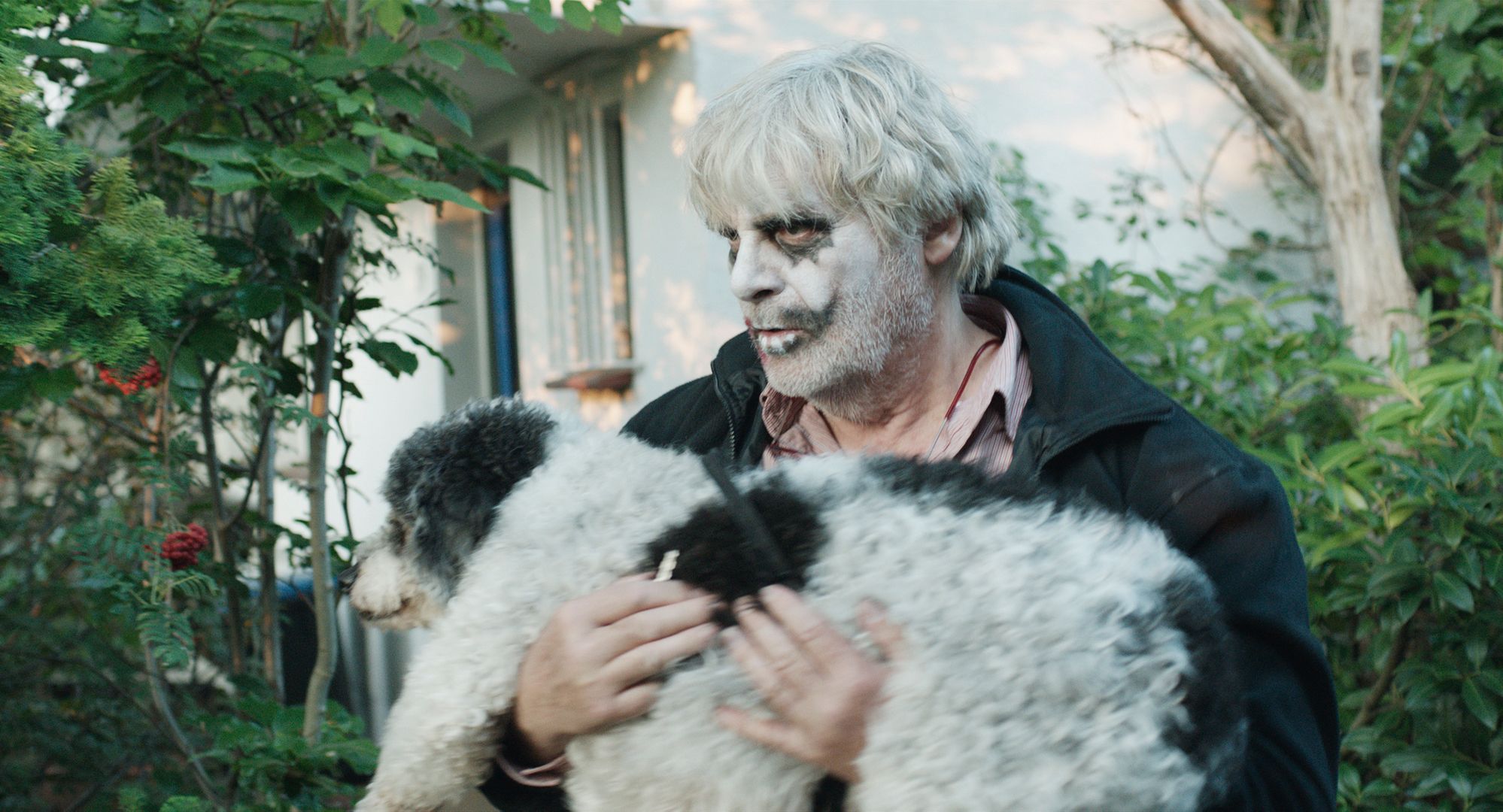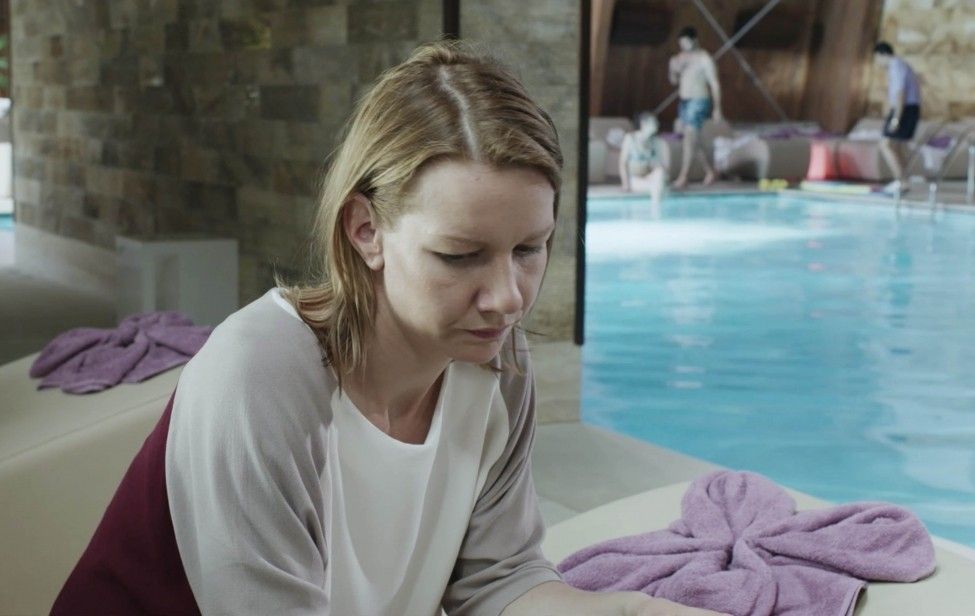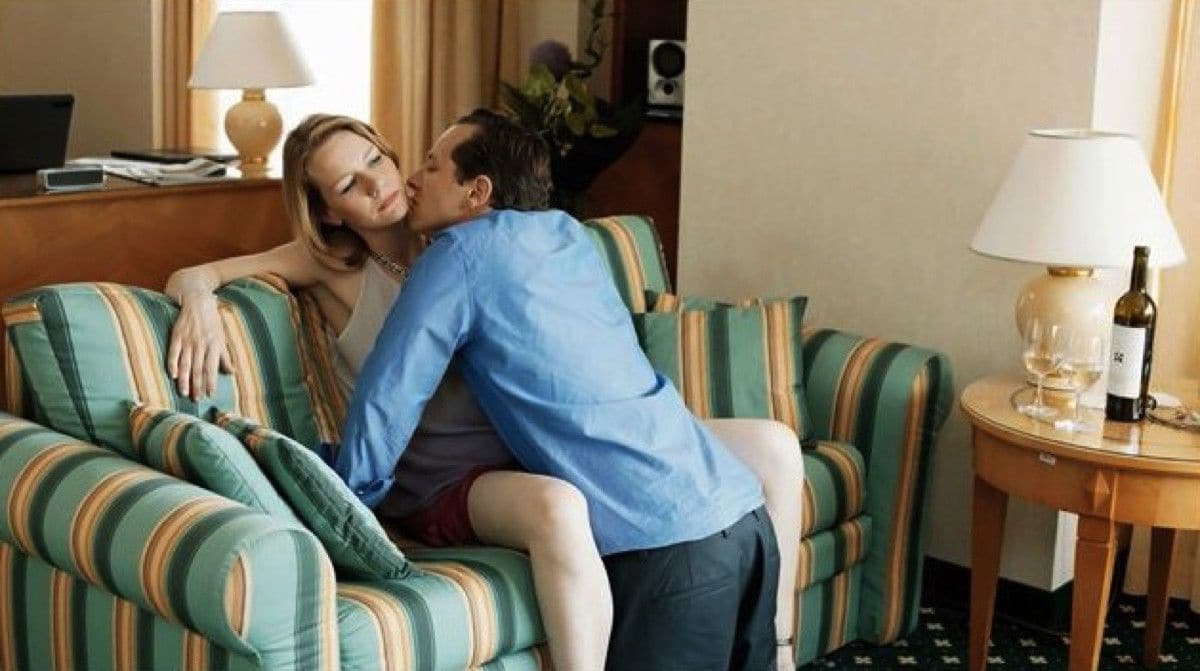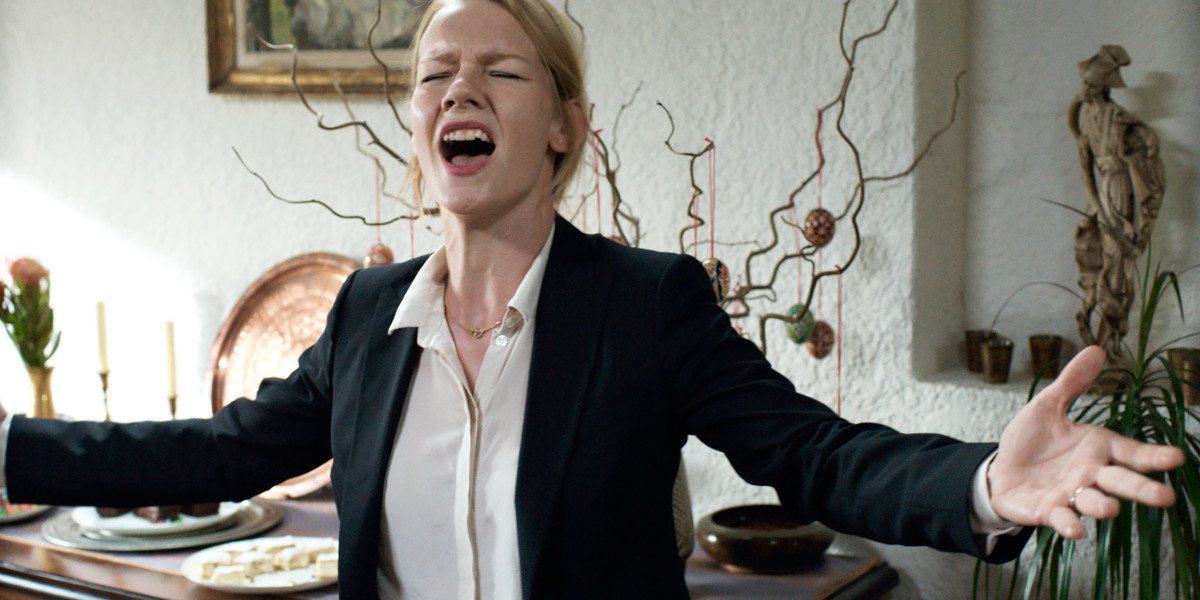The man hardly needs face paint. Or a wig. Or fake teeth. He certainly doesn't need to appear as a nine-foot mountain of hair to make a strong impression. The shaggy bear that is Winfried Conradi (Peter Simonischek) is singular enough in appearance, in overall presence, to do without props. But what fun would that be? When an opportunity for mischief presents itself, when faced with an expression of bullshit, a moment of boredom or uncertainty, out come the antic teeth. At such times, the man's already considerable visage, replete with expressive potential - jutting jaw lines that sweep down to his emphatic chin like the prow of a great ship, dark eyebrows beneath the mop of grey hair of such variable and indicating personality that they should probably be credited among the cast of Toni Erdmann - at such times, that great face can be rendered comic, demonic, or any number of shades between.
 Long though she has known him, Ines (Sandra Huller) isn't at all sure what to make of the face, the changing teeth and coiffure, the man behind (and beneath) the hair, the props, the mischief. For lucky Ines - she's Winfried Conradi's daughter. For his part, the father doesn't quite know what to think of his seemingly humorless daughter, determined as she is to succeed in the dubious world of international business.
Long though she has known him, Ines (Sandra Huller) isn't at all sure what to make of the face, the changing teeth and coiffure, the man behind (and beneath) the hair, the props, the mischief. For lucky Ines - she's Winfried Conradi's daughter. For his part, the father doesn't quite know what to think of his seemingly humorless daughter, determined as she is to succeed in the dubious world of international business.  |
| Maren Ade's first two films: Everyone Else (top) and The Forest For the Trees (right). |
If you've seen either of the first two features of writer and director Maren Ade, you might expect some strife in Toni Erdmann's central relationship of daughter and father. Everyone Else (2009) has a seemingly mismatched young German couple on holiday in Sardinia. As tends to happen with such pairs, particularly outside the comfortable buffers of their normal lives, rifts are made all too obvious by all that togetherness and the occasional cropping up of adversity. There are the predictable fights, but in Ade's writing, even these take place in a telling sort of strugging couple's bad jazz, competing time signatures of two distinct individuals jarringly out of tune. The rencontres in Everyone Else also veer toward unexpected extremes of behavior (not to predictable violence) and outright goofiness.
 The pain is more self-inflicted in Ade's first feature, The Forest For the Trees (2005). A somewhat awkward woman relocates to a new city to begin a new job and presumably a new life only to have all her efforts turn increasingly sour. Much as the story is largely about a lonely and woefully ineffectual high school teacher, there is an echo of Toni Erdman's near stalking, with the poor woman so desperately pursuing a friendship with a neighbor that the latter practically has to take out a restraining order against her. All the lonely people...sometimes they come from right across the courtyard.
The pain is more self-inflicted in Ade's first feature, The Forest For the Trees (2005). A somewhat awkward woman relocates to a new city to begin a new job and presumably a new life only to have all her efforts turn increasingly sour. Much as the story is largely about a lonely and woefully ineffectual high school teacher, there is an echo of Toni Erdman's near stalking, with the poor woman so desperately pursuing a friendship with a neighbor that the latter practically has to take out a restraining order against her. All the lonely people...sometimes they come from right across the courtyard. Even in The Forest For the Tree's fairly bleak spiral, there is a final shot that hardly offers hope, but does with a near-poetic transcendence of reality seem to ferry its troubled protagonist homeward. It shows a writer and director able take a story line or scene in completely unexpected directions. Even within a certain inevitability of plot, Ade renders key moments in colors both strange and illuminating.
And yet, for those distinct and occasionally surprising notes of discord to be found in her first two films, who could have anticipated from Maren Ade the sprawl, bite, wit and moments of tenderness, the great leap forward that is her third film? Toni Erdmann is as audacious in conception as dimension. It might well have been two and a half hours of cacophony, but Ade makes it hum a prickling, irresistible music.
Not that the elements of Toni Erdmann's story are so original - the fractious relationship of grown child and imposing, embarrassing, personal-space-invading parent; the pleasure of seeing some uptight business type destarched. We've seen these things before. But implausibility after growing implausibility spring naturally from character. They amuse, even amaze, but don't put us off as if subjected to a parade of ridiculous conceit. Instead, Ade draws us further into her story and characters even as father and daughter play out their conflicts and occasional harmonies in such extreme and often hilarious ways. To compare the apparent contrivances in Toni Erdmann to the awkward moments in the films of someone like Alexander Payne (as in his most recent film, Nebraska, with it's own bumpy odyssey of parent and child) is to realize both the breadth and tensile strength of Ade's characters and story. What seems merely gimmicky in Payne's work is at once more outlandish and deeply felt at Maren Ade's deft and assured hand.
The elder Conradi is puckish from the film's first moments. He punks a poor delivery man, telling him that the package is actually for his twin brother who just got out of jail. His offense? Mail bombs. While the nervous delivery man waits, no doubt thinking that he's not paid well enough for this sort of thing, we hear an apparent exchange between the siblings before a similar looking bulk of man appears, this one sporting sunglasses, a black robe (open, course), handcuffs (one of his standby props) and a mysterious device around his midsection. The delivery man is made all the more nervous when the device "goes off." Not to worry says Winifried, it's merely a blood pressure monitor.
Not much time expires in Toni Erdmann before we also see Winfried in a ghoulish mask of white face paint with gaping black patches of mouth and eyes. Friends and family members whom he encounters are not surprisingly taken aback. When asked why, pray tell, this imposing man is walking about in such a manner, he responds that he's taken a job at a retirement home to send its residents more quickly to the great beyond. Winfried is often the recipient of confusion, disbelief, or a kind of troubled amusement from those made privy to his hijinks. Perhaps this has something to do with the stereotype of Germans not terribly fluent in the language of irony. Or maybe, beyond his admirably consistently inappropriate behavior, Winfried is that rare improv comedian who's actually funny. What more effective disguise than that?
 As it happens, Conradi is actually thus painted for a school assembly. He leads his students on stage to serenade a colleague into retirement. You know...some bestow gold watches, others offer a choir of high school children painted like zombies; po-tay-to; po-tah-to. During the several scenes while he's in face paint, we see one of Toni Erdmann's emblematic embraces. Winfried carries his beloved, fading dog, who can hardly be bothered to walk from place to place; one shaggy salt and pepper beast lovingly hauls the other. Occurring as this does with Conradi looking a cross between The Joker and a very enthusiastic KISS fan, it's a perfect expression of Toni Erdmann's oblique moments of tenderness. Most movingly, Winfried sleeps on the patio of his home when the dog cannot be roused to come indoors. We see him arise in the morning, discover that the inevitable has occurred and then, like the wounded beast he is, pad off to a private place where he simply hangs his head.
As it happens, Conradi is actually thus painted for a school assembly. He leads his students on stage to serenade a colleague into retirement. You know...some bestow gold watches, others offer a choir of high school children painted like zombies; po-tay-to; po-tah-to. During the several scenes while he's in face paint, we see one of Toni Erdmann's emblematic embraces. Winfried carries his beloved, fading dog, who can hardly be bothered to walk from place to place; one shaggy salt and pepper beast lovingly hauls the other. Occurring as this does with Conradi looking a cross between The Joker and a very enthusiastic KISS fan, it's a perfect expression of Toni Erdmann's oblique moments of tenderness. Most movingly, Winfried sleeps on the patio of his home when the dog cannot be roused to come indoors. We see him arise in the morning, discover that the inevitable has occurred and then, like the wounded beast he is, pad off to a private place where he simply hangs his head.
The human exchanges in Toni Erdmann, up and down the generations, tend more to the biting than the loving, even the jokes carrying more brimstone than treacle. When the ghoulishly-painted Winfried visits his mother to deliver groceries (which she mainly rejects), she asks him why she he hasn't put his dog out of its misery. "I won't put you to sleep either," he responds. A lovely sentiment to keep in mind as Mother's Day approaches. When he he's left languishing in a Bucharest mall while his daughter helps a potential client's wife shop, he asks her "Are you really human?" with a slap in the face coldness. This in addition to his running joke about having hired a substitute daughter. It's not long before Ines takes her revenge, just prior (so she thinks) to her father's departure for home, "Do you have plans in life other than slipping fart cushions under people?....I know men your age who still have ambitions."
After their awkward leave taking, we see Ines break down on her hotel balcony as her father appears to begin his journey home. Beyond more obvious indications of dialog and action, much is suggested about this complicated woman by mere changes in wardrobe and setting. She looks like a kid knocking about the hotel in shorts and a long-sleeve t-shirt, all the more so while she cries from the balcony and then limps plaintively back inside. Then there is the relative armor of business clothes, even when she has to swap out a shirt with her uber eager to please assistant. Most surprising is the scene in which Ines appears in a short skirt and is braless beneath a form fitting top for something of a three-way with her colleague and a petit four.
Ines thinks her father has returned to Germany and even leaves a nice message in his voicemail. But when she meets two female friends, both in their way trying to navigate the same international waters, for dinner and drinks, she's stunned, shall we say, to encounter her dark-wigged father posing as a motivational coach by the name of...of course, Toni Erdmann. She's not going to get off as easily as she thought.
It is Winfried's intelligence and sensitive bullshit meter that are in some ways the heart of Toni Erdmann. All that replete, if sometimes overbearing humanity. As for the alter ego, Ade is shrewd enough to realize the figure is just crazy enough to make sense in the fertile field of absurdity that is capitalism. Is he really any more absurd than that other, famous Toni, the American motivational guru, Toni Robbins?
Ade certainly imbues Toni Erdmann with a rich, restive depth of character. It also show its intelligence and heart with the context of international business, globalization and its discontents. This occurs without any belaboring of points and flogging of self-righteousness.
Ines, lost in her own frustration, post-presentation, looks down from the window of the her bland conference room to people working in much less rarefied circumstances in some sort of shop below. It's a quick, telling bit of contrast, even as Ines regards the scene without any apparent sympathy or recognition. The same applies to her description of a Bucharest shopping center to her father, "It's the biggest mall in Europe and no one can afford anything in it." Toni Erdmann doesn't seek a heart of gold in its characters where they don't exist. Ines Conradi is neither particularly warm nor unfeeling. She's certainly got her hands full in a world in which being a woman doesn't exactly make the going easier. Her father may be more sympathetic to the working people they meet, but in his barreling tomfoolery, he inadvertently gets a worker at an oil rig fired.
The elder Conradi is puckish from the film's first moments. He punks a poor delivery man, telling him that the package is actually for his twin brother who just got out of jail. His offense? Mail bombs. While the nervous delivery man waits, no doubt thinking that he's not paid well enough for this sort of thing, we hear an apparent exchange between the siblings before a similar looking bulk of man appears, this one sporting sunglasses, a black robe (open, course), handcuffs (one of his standby props) and a mysterious device around his midsection. The delivery man is made all the more nervous when the device "goes off." Not to worry says Winifried, it's merely a blood pressure monitor.
Not much time expires in Toni Erdmann before we also see Winfried in a ghoulish mask of white face paint with gaping black patches of mouth and eyes. Friends and family members whom he encounters are not surprisingly taken aback. When asked why, pray tell, this imposing man is walking about in such a manner, he responds that he's taken a job at a retirement home to send its residents more quickly to the great beyond. Winfried is often the recipient of confusion, disbelief, or a kind of troubled amusement from those made privy to his hijinks. Perhaps this has something to do with the stereotype of Germans not terribly fluent in the language of irony. Or maybe, beyond his admirably consistently inappropriate behavior, Winfried is that rare improv comedian who's actually funny. What more effective disguise than that?
 As it happens, Conradi is actually thus painted for a school assembly. He leads his students on stage to serenade a colleague into retirement. You know...some bestow gold watches, others offer a choir of high school children painted like zombies; po-tay-to; po-tah-to. During the several scenes while he's in face paint, we see one of Toni Erdmann's emblematic embraces. Winfried carries his beloved, fading dog, who can hardly be bothered to walk from place to place; one shaggy salt and pepper beast lovingly hauls the other. Occurring as this does with Conradi looking a cross between The Joker and a very enthusiastic KISS fan, it's a perfect expression of Toni Erdmann's oblique moments of tenderness. Most movingly, Winfried sleeps on the patio of his home when the dog cannot be roused to come indoors. We see him arise in the morning, discover that the inevitable has occurred and then, like the wounded beast he is, pad off to a private place where he simply hangs his head.
As it happens, Conradi is actually thus painted for a school assembly. He leads his students on stage to serenade a colleague into retirement. You know...some bestow gold watches, others offer a choir of high school children painted like zombies; po-tay-to; po-tah-to. During the several scenes while he's in face paint, we see one of Toni Erdmann's emblematic embraces. Winfried carries his beloved, fading dog, who can hardly be bothered to walk from place to place; one shaggy salt and pepper beast lovingly hauls the other. Occurring as this does with Conradi looking a cross between The Joker and a very enthusiastic KISS fan, it's a perfect expression of Toni Erdmann's oblique moments of tenderness. Most movingly, Winfried sleeps on the patio of his home when the dog cannot be roused to come indoors. We see him arise in the morning, discover that the inevitable has occurred and then, like the wounded beast he is, pad off to a private place where he simply hangs his head. The human exchanges in Toni Erdmann, up and down the generations, tend more to the biting than the loving, even the jokes carrying more brimstone than treacle. When the ghoulishly-painted Winfried visits his mother to deliver groceries (which she mainly rejects), she asks him why she he hasn't put his dog out of its misery. "I won't put you to sleep either," he responds. A lovely sentiment to keep in mind as Mother's Day approaches. When he he's left languishing in a Bucharest mall while his daughter helps a potential client's wife shop, he asks her "Are you really human?" with a slap in the face coldness. This in addition to his running joke about having hired a substitute daughter. It's not long before Ines takes her revenge, just prior (so she thinks) to her father's departure for home, "Do you have plans in life other than slipping fart cushions under people?....I know men your age who still have ambitions."
After their awkward leave taking, we see Ines break down on her hotel balcony as her father appears to begin his journey home. Beyond more obvious indications of dialog and action, much is suggested about this complicated woman by mere changes in wardrobe and setting. She looks like a kid knocking about the hotel in shorts and a long-sleeve t-shirt, all the more so while she cries from the balcony and then limps plaintively back inside. Then there is the relative armor of business clothes, even when she has to swap out a shirt with her uber eager to please assistant. Most surprising is the scene in which Ines appears in a short skirt and is braless beneath a form fitting top for something of a three-way with her colleague and a petit four.
Ines thinks her father has returned to Germany and even leaves a nice message in his voicemail. But when she meets two female friends, both in their way trying to navigate the same international waters, for dinner and drinks, she's stunned, shall we say, to encounter her dark-wigged father posing as a motivational coach by the name of...of course, Toni Erdmann. She's not going to get off as easily as she thought.
It is Winfried's intelligence and sensitive bullshit meter that are in some ways the heart of Toni Erdmann. All that replete, if sometimes overbearing humanity. As for the alter ego, Ade is shrewd enough to realize the figure is just crazy enough to make sense in the fertile field of absurdity that is capitalism. Is he really any more absurd than that other, famous Toni, the American motivational guru, Toni Robbins?
 | |||||||||||||||||||||||||||||||||||||||||
| Don't you hate it when you're having perfectly normal naked birthday part and a Kuker shows up? Sandra Huller and, somewhere beneath the hair, Peter Simonischek, in Toni Erdmann. |
Ade certainly imbues Toni Erdmann with a rich, restive depth of character. It also show its intelligence and heart with the context of international business, globalization and its discontents. This occurs without any belaboring of points and flogging of self-righteousness.
Ines, lost in her own frustration, post-presentation, looks down from the window of the her bland conference room to people working in much less rarefied circumstances in some sort of shop below. It's a quick, telling bit of contrast, even as Ines regards the scene without any apparent sympathy or recognition. The same applies to her description of a Bucharest shopping center to her father, "It's the biggest mall in Europe and no one can afford anything in it." Toni Erdmann doesn't seek a heart of gold in its characters where they don't exist. Ines Conradi is neither particularly warm nor unfeeling. She's certainly got her hands full in a world in which being a woman doesn't exactly make the going easier. Her father may be more sympathetic to the working people they meet, but in his barreling tomfoolery, he inadvertently gets a worker at an oil rig fired.
Ade lets Ines be a real, flawed person in her context. There's perhaps no great depth, no artist waiting to climb out of the business clothing. But she's revealed enough to demonstrate both her vulnerability and the sometimes perverse expressions of her strength and exasperation. She fights back in sometimes surprising ways with her force of nature father, as well as her boss - after he prefaces a statement by saying "This will offend the feminist in you," she responds, "If I was a feminist, "I wouldn't tolerate guys like you, Gerald." And while it might not be deeply satisfying, she sets the sexual agenda with her colleague, Tim (Trystan Putter). He speaks of taking her "in every corner of the room" so she won't lose her bite. She instructs him to deflower a pricey confection, as she looks on and then mater-of-factly devours the product of this strange congress of man and marzipan.
Winfried Conradi might be the obvious heart and wit of Toni Erdmann, but when Ines is pushed to extremes, she provides what may be the film's most outlandish and memorable moments. When her father crashes a Romanian family's Easter gathering, he puts his daughter on the spot to sing a song to express their gratitude at the hospitality shown them. With her father accompanying her on a small keyboard, Ines surprises everyone by positively belting out a version of "The Greatest Love of All," as if competing very well on a Euro version of "Idol." This before she practically drops the mic and makes her exit. Thank you Bucharest! Good night!
Then there is Ines' birthday party, ostensibly a team-building brunch for her business associates. With the catered food and flowers impeccably in place, she struggles with her rather movement-restrictive dress. As she loses her patience with the garment, something seems to snap, and it's not the frock. The doorbells ring incites this exasperation. Finally, she pulls the dress over her head, tosses it aside and answers the door in panties and nothing else. The concept of the naked birthday party is born and gathers a bizarre momentum, if not the expected roster of guests. As Ines' pathologically eager to please assistant and boss join in we're already privy to a scene a bit unlike anything seen before. It's all quite memorable even before the Kuker shows up, presumably the father in this towering costume of hair and naked daughter regarding one another. Even before she pursues the creature when it departs, this in a relatively modest costume of light robe and bare feet down a Bucharest sidewalk. Ultimately, in a nearby park there is one of the more touching and unlikely embraces in cinematic history.
There may be some slightly greater understanding, some better-seasoned tolerance that exists between father and daughter at the conclusion of Toni Erdmann while's she's home to attend her grandmother's funeral. But there's no pat development of character. There's no revelation other than that we are likely to miss revelation when it shimmers briefly before us. It's not so much comedy or tragedy as ungainly, insuperable life. Maren Ade brings this sprawling duet home as well as she keeps it going - a brief coda at turns goofy, tender, frank, profound, understated and a little sad.
db
.jpg)







Comments
Post a Comment